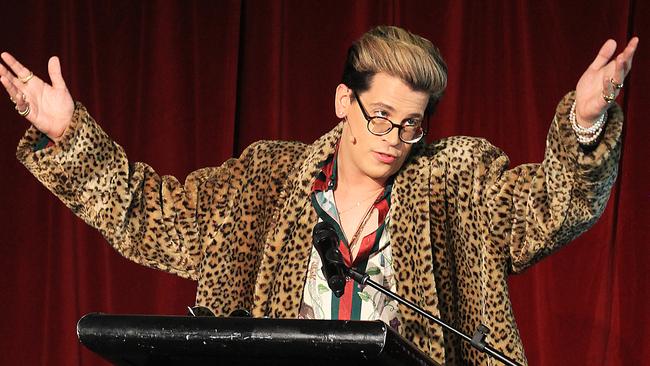Editor’s criticism of Milo Yiannopoulos book revealed
Scathing criticism of Milo Yiannopoulos’ autobiography by his former editor has been revealed in court documents.

The former editors of Milo Yiannopoulos’ autobiography Dangerous described the contents of his book as “egotistical boasting,” “ self-aggrandisement” and “self-serving,” and criticised his arguments as “scattershot thinking,” and “phenomenally petty,” court documents have revealed.
Mr Yiannopoulos is suing Simon & Schuster for breach of contract after the publisher, which had paid him a $34,500 advance for the rights to the book, cancelled the deal after a recording emerged which appeared to show the alt-right commentator endorsing sex with “younger boys”.
As part of their case, the publisher has submitted documents to the court which show they had a multitude of problems with the book, including Mr Yiannopoulos “repeating Fake News,” and “trolling.”
In a sworn affidavit, editor Mitchell Ivers said that he and his colleagues at the publisher were “disappointed with the work” that Mr Yiannopoulos submitted at the beginning of last year. “It was not the serious and substantial commentary on free speech and political correctness that we discussed,” he said. “Instead, it was a superficial reworking of Mr Yiannopoulos’ various speeches where he fed one-liners to crowds and made incendiary comments.”
It was also “riddled with highly offensive commentary and ‘jokes’ that were distractions and many would see as racist, misogynist, anti-immigrant, antisemitic or homophobic,” he said.
If the affidavit is scathing, Mr Ivers’ notes on the draft manuscript are even harsher, including criticism that Mr Yiannopoulos’ only argument against feminists is “that they are ugly and sexless and have cats,” and: “If you want to make a case for gay men going back into the closet ... you’re going to have to employ a lot more intellectual rigour than you use here.”
Read the court documents here
Mr Ivers’ notes in the margins of the draft manuscript demand, with some incredulity, that Mr Yiannopoulos back up his various claims. To an early assertion that 2016 “was the year of me,” Mr Ivers writes: “Careful that the egotistical boasting ... doesn’t make you seem juvenile.” To a quip about science fiction authors writing stories about travelling back in time to kill 1920s Marxist thinker Antonio Gramsci, Mr Ivers wrote succinctly: “Unclear, unfunny, delete.”
In a chapter where Mr Yiannopoulos takes aim at feminism, Mr Ivers warns: “Don’t start chapter with accusation that feminists = fat. It destroys any seriousness of purpose.” He tells him later in the chapter: “Don’t make lesbians a slur.”
Mr. Ivers is getting pretty sick of your bullshit, young man. pic.twitter.com/o4TEyYhomi
— Sarah Mei (@sarahmei) December 28, 2017
To a section titled “Take men’s issues seriously,” Mr Ivers tells Mr Yiannopoulos: “This whole section is filled with assertions that don’t have the weight of fact.”
Mr Yiannopoulos, who frequently boasts of having a black husband, is also asked throughout the text to tone down racist comments. “Let’s not call South Africa ‘white,” suggests Mr Ivers who also criticises the writer for describing Africa as the “dark continent.”
“It sounds like darkies,” Mr Ivers reprimands him.
He goes on to slap down Mr Yiannopoulos’ argument that: “Given my penchant for black men ... I can’t be accused of being racist.”
“You will have to address the charge of racism clearly and with greater depth,” he tells him.
He also points out: “This is not the time or place for another black-dick joke.”
He delets an entire chapter, entitled: “Why Ugly People Hate Me, ” telling him: “The whole chapter is a problem in tone.” He goes on: “All this pop psychology is hogwash. You can’t say ugly people are drawn to the left. Have you ever seen the people at a Trump rally?”
This week, Mr Ivers retweeted “without comment” a tweet by PubPerspectives editor-in-chief Porter Anderson quoting his criticism that the book was “at best, a superficial work full of incendiary jokes with no coherent or sophisticated analysis of political issues.”
Court filings say @simonschuster editor @MitchellIvers considered #MiloYiannopoulos' first draft "at best, a superficial work full of incendiary jokes with no coherent or sophisticated analysis of political issues." Cader / @PublishersLunch https://t.co/Ws21o5dImC
— Porter Anderson (@Porter_Anderson) December 23, 2017
He also tweeted that he would wear a T-shirt quoting his comment “Unclear. Unfunny. Delete.”
Mr Yiannopoulos eventually self-published his book in July.
Someone made it into a t-shirt. Also the one that says "Unclear. Unfunny. Delete." I would wear the latter, but the former? I think not!
— Mitchell Ivers (@MitchellIvers) December 28, 2017


